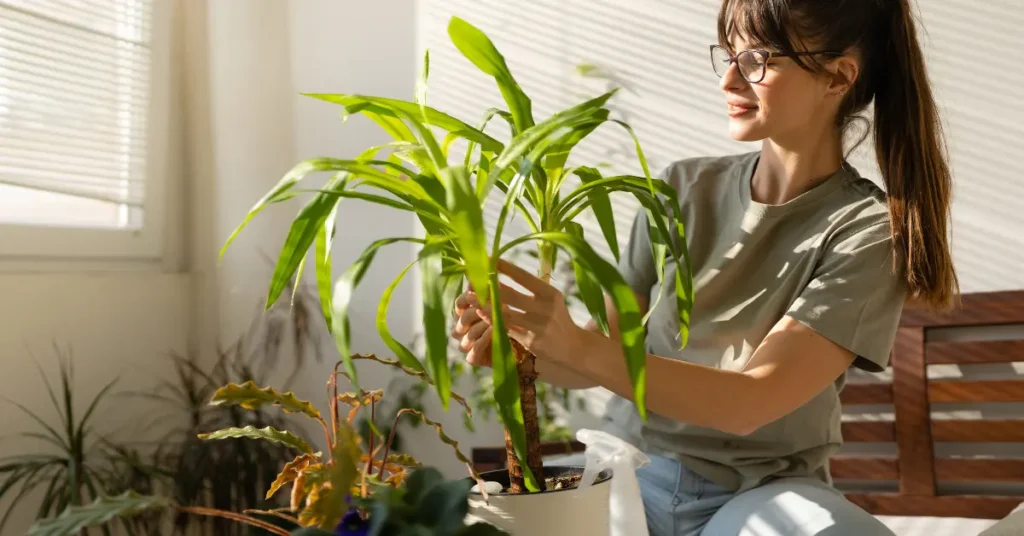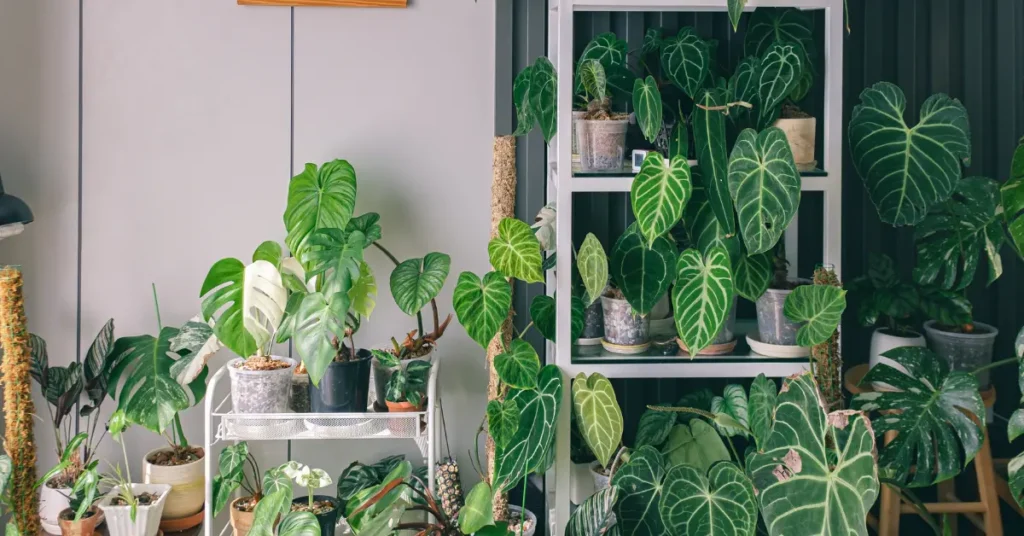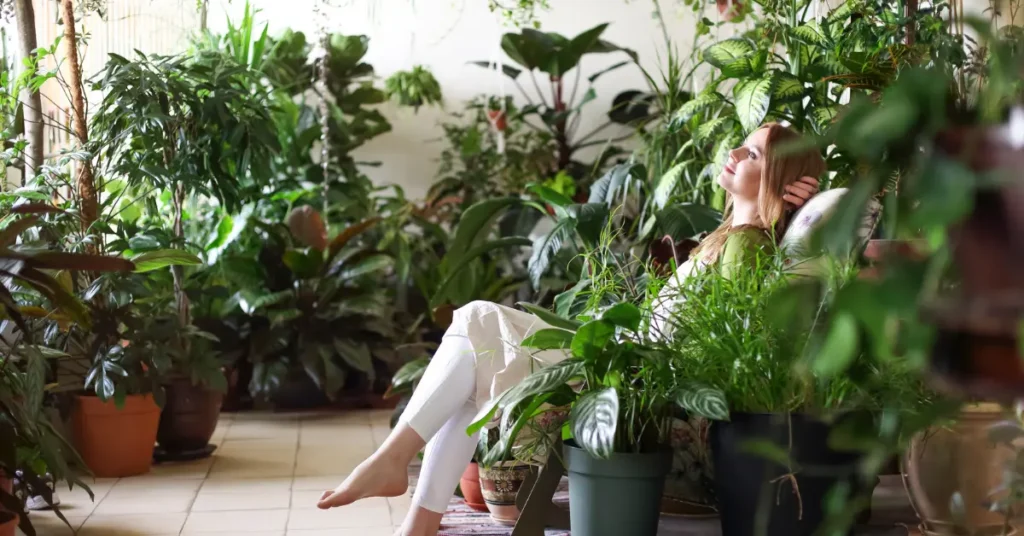Introduction: How Indoor Plants Enhance Mental Well-Being
In recent years, the popularity of indoor plants has surged, with more people bringing greenery into their homes not just for decoration but for its therapeutic benefits. Studies have shown that indoor plants can significantly boost mental health by reducing stress, increasing focus, and even elevating mood. With many individuals living in urban areas, where access to natural landscapes is limited, indoor plants offer a simple yet effective way to connect with nature.
Incorporating plants into your home is an affordable and accessible strategy to improve mental well-being, particularly for city dwellers. From purifying the air to creating a calming atmosphere, indoor plants are more than just a home décor trend—they are a source of natural healing. In this article, we’ll explore the mental health benefits of indoor plants, how they improve well-being, and the best plants to choose for an easy, indoor-friendly green sanctuary.
Stress Reduction and Enhanced Relaxation
One of the most widely known benefits of indoor plants is their ability to reduce stress and promote relaxation. Research has shown that simply being around plants can lower cortisol levels (the body’s main stress hormone), helping individuals feel calmer and more relaxed. For example, a study published by the National Institutes of Health (NIH) found that interacting with indoor plants can reduce physiological and psychological stress.

How Indoor Plants Reduce Stress
Indoor plants create a natural, calming environment that can make people feel more at ease. This is partly due to a phenomenon called biophilia—the human tendency to seek connections with nature. Indoor plants fulfill this need by bringing nature into the home, providing visual and tactile experiences that are known to reduce stress. Studies also suggest that greenery in our surroundings triggers a relaxation response, similar to the effects of meditative practices.
For tips on how to keep your plants healthy and thriving, check out our guide on Repotting Made Easy: How to Keep Your Indoor Plants Thriving. This can be particularly helpful for urban gardeners who want their indoor plants to remain vibrant and lush.
Creating a Calming Atmosphere
Plants add a touch of tranquility to any room, transforming it into a peaceful oasis. For instance, placing a few potted plants in a living room or office space can soften harsh surroundings and reduce visual clutter, creating a more serene environment. Some plants, like lavender and jasmine, even emit soothing scents that have been found to reduce anxiety and encourage relaxation.
For those living in bustling urban environments, indoor plants offer a sanctuary within the home, helping to reduce the sensory overload often experienced in cities. This shift to a more calming, plant-filled space can have a profound impact on daily mood and mental health.

Boosting Focus and Productivity
Beyond relaxation, indoor plants have been shown to increase focus and productivity, making them an ideal addition to any workspace. Studies have found that greenery in the office or study area can improve concentration and cognitive performance, leading to better productivity and work satisfaction. In fact, a study by Ambius revealed that employees with plants in their workspaces experienced a 15% boost in productivity and reported higher levels of job satisfaction.
How Plants Enhance Cognitive Function
Plants in a work environment can stimulate the mind and reduce mental fatigue. They introduce a natural element that breaks up sterile environments, reducing mental burnout and allowing the brain to recharge. Additionally, colors like green are known to have a soothing effect on the mind, helping with attention span and creativity.
For students or professionals working long hours, adding plants like spider plants, pothos, or even small herb plants can create a fresh, engaging environment that promotes alertness. These plants are easy to care for and can thrive indoors, making them perfect for enhancing focus in study or work settings.
Plants that Improve Focus and Productivity
Some plants are particularly well-suited for improving focus and creating a productive atmosphere. Here are a few that can thrive indoors:
- Snake Plant: Known for its air-purifying qualities and ability to improve oxygen flow, snake plants are resilient and require minimal maintenance.
- English Ivy: This plant has been shown to remove airborne mold, making it ideal for improving air quality and providing a fresher work environment.
- Pothos: Easy to grow and adaptable to various lighting conditions, pothos adds vibrant greenery without demanding much care.
These plants not only brighten up a room but also create an environment that supports mental clarity and productivity, making them ideal companions for both home and office settings.

Enhanced Mood and Mental Well-Being
Indoor plants do more than just beautify a space; they also have a profound effect on mood and overall mental health. Research shows that interacting with nature can reduce symptoms of depression and anxiety, creating a more positive and balanced mental state. Plants introduce a natural, life-affirming energy that promotes a sense of well-being, especially in urban spaces where natural landscapes are limited.
How Plants Elevate Mood
The presence of greenery has been shown to boost serotonin levels, which play a key role in stabilizing mood and feelings of happiness. Studies, like those conducted by Horticultural Therapy journals, show that plants act as a mood enhancer, especially for people who spend prolonged periods indoors. The act of caring for plants also offers a therapeutic effect, providing a sense of purpose and nurturing that can be especially helpful for individuals struggling with mental health.
Incorporating plants into indoor spaces can foster a connection to nature, which helps reduce feelings of isolation and improves emotional well-being. For instance, simply taking a moment to water plants or tend to them can serve as a form of mindfulness, allowing individuals to pause, breathe, and reset their minds.
Reducing Symptoms of Depression and Anxiety
Certain plants, like lavender and rosemary, release natural aromas that are known to reduce anxiety and promote relaxation. Their soothing scents are often used in aromatherapy to alleviate stress and anxiety, making these plants ideal for home environments. Additionally, greenery helps reduce visual stress, creating a more calming atmosphere that can benefit those with anxiety or depression.
In cities, where urban life can be intense and overstimulating, plants provide a natural counterbalance. Bringing greenery indoors has been linked to lower levels of mental distress and a reduction in symptoms of anxiety, making plants a simple yet powerful addition to one’s mental health toolkit.

Air Quality and Its Link to Mental Health
Indoor plants are often praised for their ability to purify the air, removing toxins and pollutants that accumulate indoors. Clean air is crucial for mental clarity and brain health, as polluted indoor environments can lead to symptoms like headaches, fatigue, and reduced focus. By improving indoor air quality, plants contribute to both physical and mental well-being.
The Impact of Clean Air on Mental Clarity
Studies have shown that poor air quality can negatively affect cognitive function, mood, and overall mental health. Pollutants such as carbon dioxide (CO₂) and volatile organic compounds (VOCs) can lead to brain fog and sluggishness. Plants, particularly those known for their air-purifying properties like the peace lily and snake plant, absorb CO₂ and filter out harmful toxins, creating a healthier environment.
Clean air directly influences mental clarity, alertness, and mood, allowing individuals to feel more energized and focused throughout the day. In urban areas, where pollution levels are higher, creating a home filled with air-purifying plants can be a simple but impactful step toward maintaining optimal mental health.
Best Air-Purifying Plants for Mental Health
Here are some top air-purifying plants that are known to improve indoor air quality and support mental clarity:
- Peace Lily: This plant is highly effective at removing VOCs like formaldehyde and benzene, commonly found in household items and cleaning products.
- Boston Fern: Known for its high transpiration rate, the Boston fern adds moisture to the air, making it ideal for those who live in dry environments.
- Aloe Vera: Not only does aloe vera improve air quality, but it also has healing properties that make it a multi-purpose plant.
By introducing these plants into your indoor space, you can create an environment that supports better air quality and, consequently, better mental health.

Top Plant Recommendations for Mental Wellness
Choosing the right indoor plants for mental wellness doesn’t have to be complicated. The key is to select low-maintenance varieties that provide mental health benefits through their appearance, air-purifying abilities, and aromatic qualities. Here are some easy-to-care-for plants that offer specific wellness benefits:
Lavender
Benefits: Lavender is well-known for its soothing fragrance, which can reduce stress and help with relaxation. This plant is ideal for spaces where you want to unwind, such as bedrooms or meditation areas.
Care: Lavender prefers plenty of light and a moderate amount of water. Place it near a window to keep it healthy and fragrant.
Spider Plant
Benefits: The spider plant is easy to care for and one of the most effective air-purifiers, removing toxins like carbon monoxide and xylene. It’s also pet-friendly, making it a great choice for homes with animals.
Care: Spider plants thrive in indirect sunlight and require watering once a week. They’re hardy and adaptable, making them suitable for beginners.
Rosemary
Benefits: Known for its refreshing aroma, rosemary has cognitive-enhancing properties and is linked to improved memory and focus. Its scent is invigorating, making it an excellent choice for study or work areas.
Care: Rosemary prefers a sunny spot and slightly dry soil. Keep it by a sunny window to enjoy both its fragrance and mental health benefits.
Snake Plant
Benefits: The snake plant is low-maintenance and known for its air-purifying qualities. It releases oxygen even at night, which can improve indoor air quality and promote restful sleep.
Care: This plant tolerates low light and infrequent watering, making it perfect for rooms that don’t get much sunlight.
These plants not only beautify your space but also contribute to a calm, clean, and healthy environment that supports mental well-being.
If you’re looking for easy-to-care-for plants that can still boost your mood, consider exploring our guide on Flowering Cacti Made Easy: The Best Low-Maintenance Indoor Cactus Care Guide. These low-maintenance plants are ideal for adding greenery to your space without demanding much attention.






















